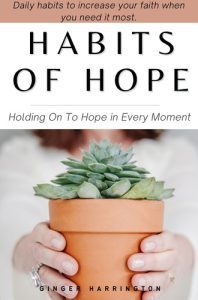What does it mean to forgive and how do we live it out? Discover how forgiving sets you free with powerful steps to hope and healing. Holding onto resentment doesn’t punish the other person; it keeps you trapped. Don’t miss the free downloadable guide with this post!
If you’re feeling stuck, weighed down, or even resistant to forgiving someone, you’re not alone. God has given us a path to freedom, healing, and peace. In this post, we’ll uncover practical steps and spiritual truths to help you release resentment, embrace hope, and make forgiveness a habit.
If you’re ready to step into freedom, keep reading—and if you want deeper encouragement, listen to the full episode of the Habits of Hope Podcast!
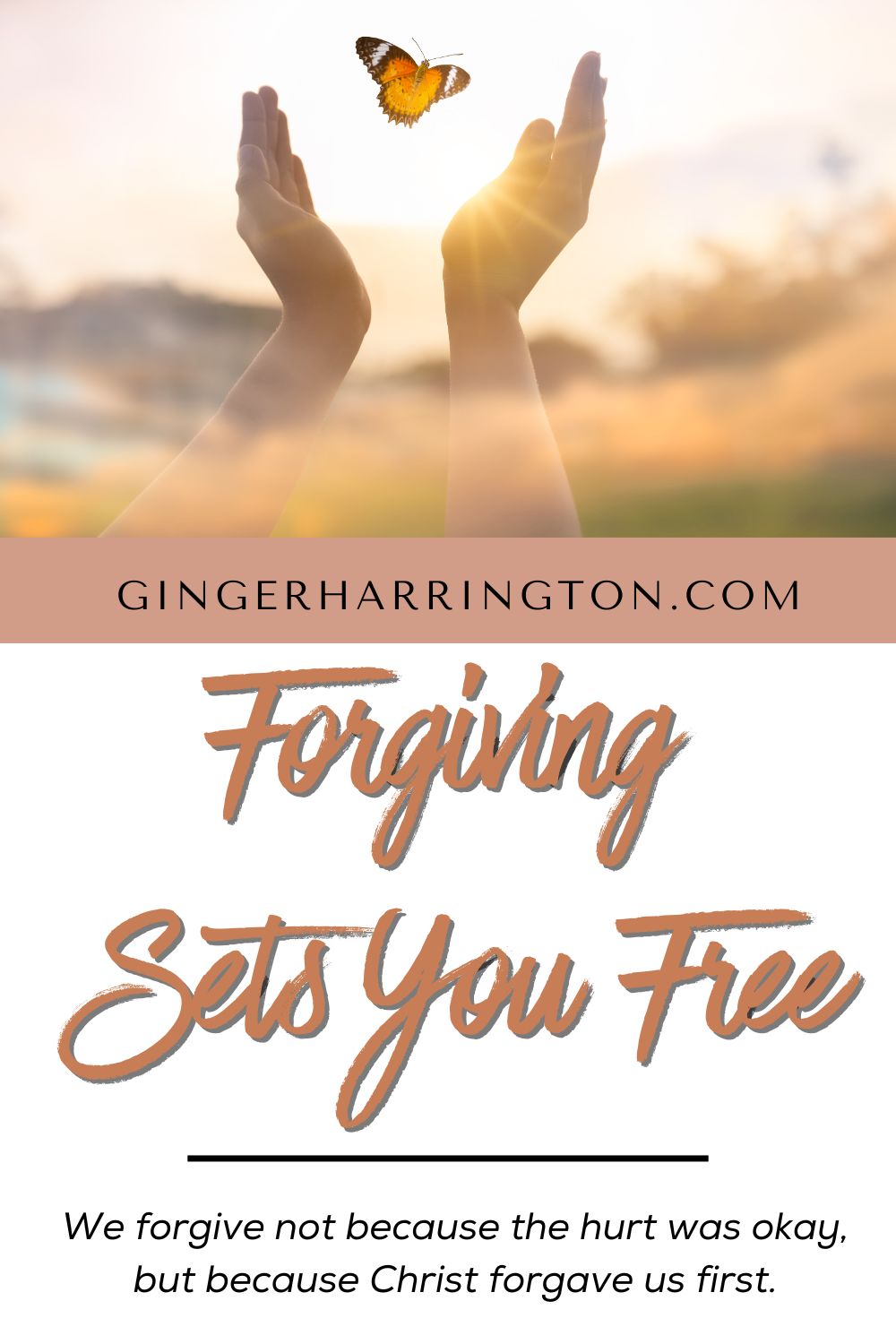
Understanding Biblical Forgiveness
One of my favorite verses about the importance of forgiving others is found in Colossians 3:13: “Bear with each other and forgive one another if any of you has a grievance against someone. Forgive as the Lord forgave you.”
- Forgiveness Reflects Christ: We forgive not because the other person deserves it but because Christ forgave us first.
- Forgiveness Requires God’s Strength: Without the life and love of Christ within us, it’s impossible to forgive at the level we are called to.
- Part of Christian Living: Paul teaches that forgiveness is essential to walking in love and living out the Christian life.
- Not Based on Feelings: Forgiveness is a decision, not something that depends on our emotions. We must trust God with the offense even when we don’t feel like forgiving.
- Aligning with Our Identity in Christ: As new creations, our nature in Christ is to forgive, but we often fall back into old coping strategies and flesh patterns.
This verse inspires a powerful habit of hope:
Forgive as Christ forgave you, as you let go of resentment and trust God with your pain.
With this habit of hope, forgiveness becomes a bridge to healing and freedom from our pain. Is it easy? Not at all, but it is worth it!
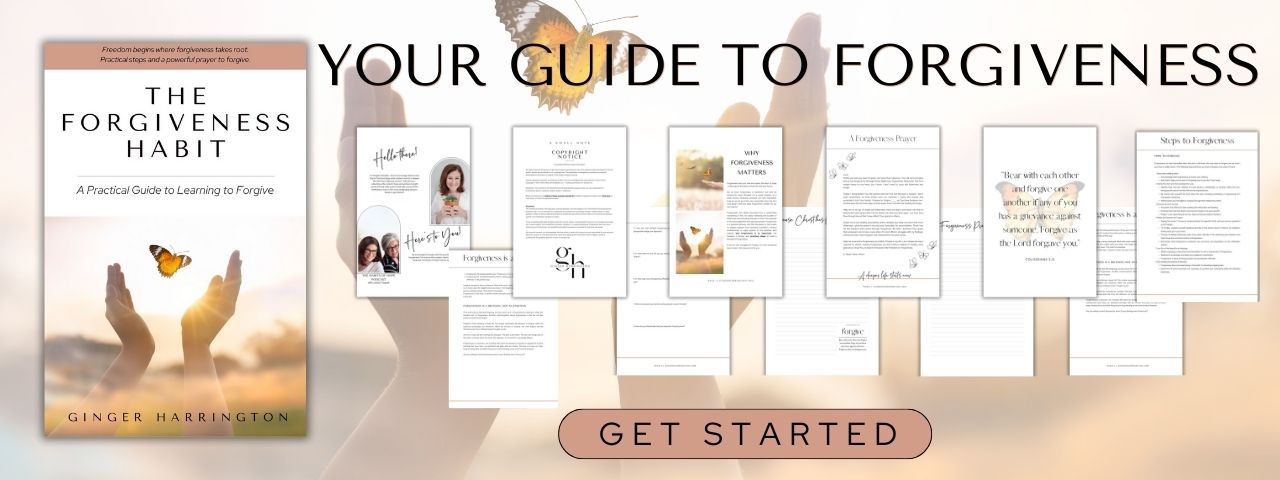
pages of a pdf on how forgiveness sets you free are displayed over an image of open hands releasing a butterfly.
What Forgiveness Is (and Isn’t)
Forgiving sets us free and opens the door to hope. Many people hesitate to forgive for many reasons. Let’s clear up some common misconceptions about what it means to forgive:
- Forgiveness is NOT excusing the offense. It does not mean what happened was okay.
- Forgiveness is NOT forgetting, discounting the offense, or pretending everything’s fine. Some wounds leave lasting scars, but healing means they no longer control us.
- Forgiveness is NOT about who deserves it; it’s about trusting God with justice and releasing yourself from the weight of anger.
- Forgiveness is NOT reconciliation. While forgiveness is a personal choice, reconciliation requires effort from both parties. Reconciliation may come, but it is important to understand the distinction between the two.
- Forgiveness IS releasing bitterness. It frees you from carrying the weight of resentment.
- Forgiveness IS trusting God with justice. Letting go means allowing God to deal with the offender in His perfect way.
Imagine carrying a heavy backpack filled with rocks—each one representing a grudge or past hurt. Every day, the weight slows you down. The longer you carry it, the heavier it feels. Now picture setting it down. The relief is immediate.
Forgiveness is like that. It doesn’t erase the pain, but it frees you from carrying the burden every day.
Forgiveness is a Decision, Not an Emotion
If we wait until we feel like forgiving, we may never do it— Processing our feelings is often the hardest part of forgiveness. Another misconception about forgiveness is that we will feel better as soon as we forgive.
Imagine a train climbing a steep hill. The engine represents the decision to forgive, while the caboose symbolizes our emotions. When we choose to forgive, the train begins moving forward, even if our feelings haven’t caught up yet.
At first, it may feel like nothing has changed. The pain is still there. The hurt still stings. But as the train continues down the track, the caboose—our emotions—eventually follows.
Forgiveness is a decision, not a feeling. We make the decision to forgive in obedience to God, trusting that over time, our emotions will align with our choice. The key is to stay on track, keep trusting God, and allow His grace to bring healing as we move toward freedom.
Are you willing to start the journey, even if your feelings aren’t there yet?
How to Forgive: Steps to Freedom Through Forgiveness
Forgiveness can feel impossible when the pain is still fresh. We may want to forgive, but we aren’t sure how to really mean it. The following steps will show you how to forgive, even when it’s hard.
- Start with a Willing Heart
- Acknowledge that forgiveness is a choice, not a feeling.
- Ask God to help you be open to forgiving, even if you don’t feel ready.
- Name the Hurt and Acknowledge the Loss
- Identify what was lost—whether it’s trust, peace, a relationship, or security. Name the hurt, being specific about how the offense has impacted you.
- Be honest with yourself and God about the pain. Avoiding, minimizing or suppressing hurt only keeps it festering.
- Writing down your thoughts or praying through them helps bring clarity.
- Entrust the Hurt to God
- Surrender the offense to God, trusting Him with justice and healing.
- Embrace the truth that God’s command to forgive is for your benefit.
- Prayer: “Lord, I give this pain to You. Help me heal and walk in freedom.”
- Make the Decision to Forgive
- Saying the words “I choose to forgive [name] for [specific hurt]” out loud can be a powerful act of release.
- If it helps, visualize yourself speaking directly to the person (even if they’re not present), letting them go in your heart.
- Choose to release bitterness, even if you don’t feel like it.This reinforces your decision and helps break the emotional hold of unforgiveness.
- Remember that forgiveness is between you and God, not dependent on the offender’s actions.
- Let Go of the Need for an Apology
- While an apology is important and meaningful, it is not a requirement of forgiveness.
- Waiting for an apology only keeps you trapped in resentment.
- Forgiveness is about freeing yourself, not excusing the offender.
- Set Healthy Boundaries if Needed
- Forgiveness does not mean being a “doormat” or tolerating ongoing harm.
- Determine if some kind limits are necessary to protect your well-being while still releasing bitterness.
- Pray for the Person Who Hurt You
- This step may feel impossible at first, but prayer shifts your heart from bitterness to peace.
- Jesus said in Luke 6:27-28: “Love your enemies, do good to those who hate you, bless those who curse you, pray for those who mistreat you.”
- Prayer doesn’t justify their actions—it softens your heart and places them in God’s hands.
- Commit to the Process of Forgiveness
- Embrace the Freedom That Forgiveness Brings
- By faith, receive the blessings of forgiveness, trusting God to make it a reality in your experience in His timing.
- Recognize the peace, healing, and emotional freedom that come with forgiveness.
- Walk forward in hope, knowing that forgiveness is a reflection of God’s grace in your life.
- Seek support if needed.
- Deep wounds can be difficult to navigate alone. When needed, seek wise counsel from a trusted friend, mentor, or therapist.
- Pray and ask God to lead you to the right person who can offer wisdom and support.
When we don’t forgive or deal with our pain, bitterness can become part of our identity. We can begin to see ourselves as victims, allowing the pain to control or define our lives. Truly, this is no way to live. It is not God’s desire for you to be a prisoner to the pain of the past. This is why it’s so important to understand the meaning of forgiveness and how to do it!
Podcast Quotes on Forgiving
- “Forgiveness is a gift that sets us free and opens the door to hope.”
- “Forgiveness isn’t about excusing the hurt or pretending everything’s fine.”
- “When you feel the weight of hurt, choose to forgive as Christ forgave you.”
- “Forgiveness requires patience, humility, and a willingness to let go of grievances.”
- “We forgive not because the hurt was okay, but because Christ forgave us first.”
- “Forgiveness isn’t about who deserves it; it’s about reflecting God’s grace.”
- “Forgiveness isn’t just for the other person—it’s for you.”
- “Letting go doesn’t change the past, but it frees your future.”
Practical Ways to Practice the Forgiveness Habit
Make forgiveness a natural part of your life with these simple daily practices.
✔ Keep short accounts. Address issues quickly before resentment builds up.
✔ Reflect each night. Before bed, reaffirm your choice to forgive and release any lingering bitterness.
✔ Remind yourself of God’s grace. Just as Christ forgave you, you are called to extend that grace to others.
✔ Use Scripture as a guide. Meditate on Colossians 3:13 and Matthew 18:21-22.
By making forgiveness a habit, you’ll not only experience greater peace and healing but also reflect Christ’s love in your daily life.
What Happens When You Forgive?
When you choose forgiveness, you step into freedom from bitterness and the taxing weight of carrying old wounds. Holding grudges may feel like self-protection, but in reality, it only keeps you bound.
Forgiveness, on the other hand, opens the door to healing and peace. It strengthens your faith, deepens your dependence on God, and helps you grow spiritually in ways you never imagined.
As you let go, you’ll begin to notice a shift—your heart softens, your relationships strengthen, and peace replaces the turmoil that once lived inside you. And here’s the beautiful part: when you forgive, you reflect the love of Christ in a powerful way. The world is watching how we respond to hurt, and when we choose grace over grievance, we become a living testimony of God’s grace.
This week, take action by choosing one of the following:
- Identify a person or situation where you need to forgive.
- Write down what you need to release and pray through it.
- Ask God to help you forgive, even if you’re not ready.
- Pray for someone who has hurt you.
Even though forgiveness is a decision, it is also a journey of trust, faith, and growth. Every step you take brings you closer to the freedom God desires for you.
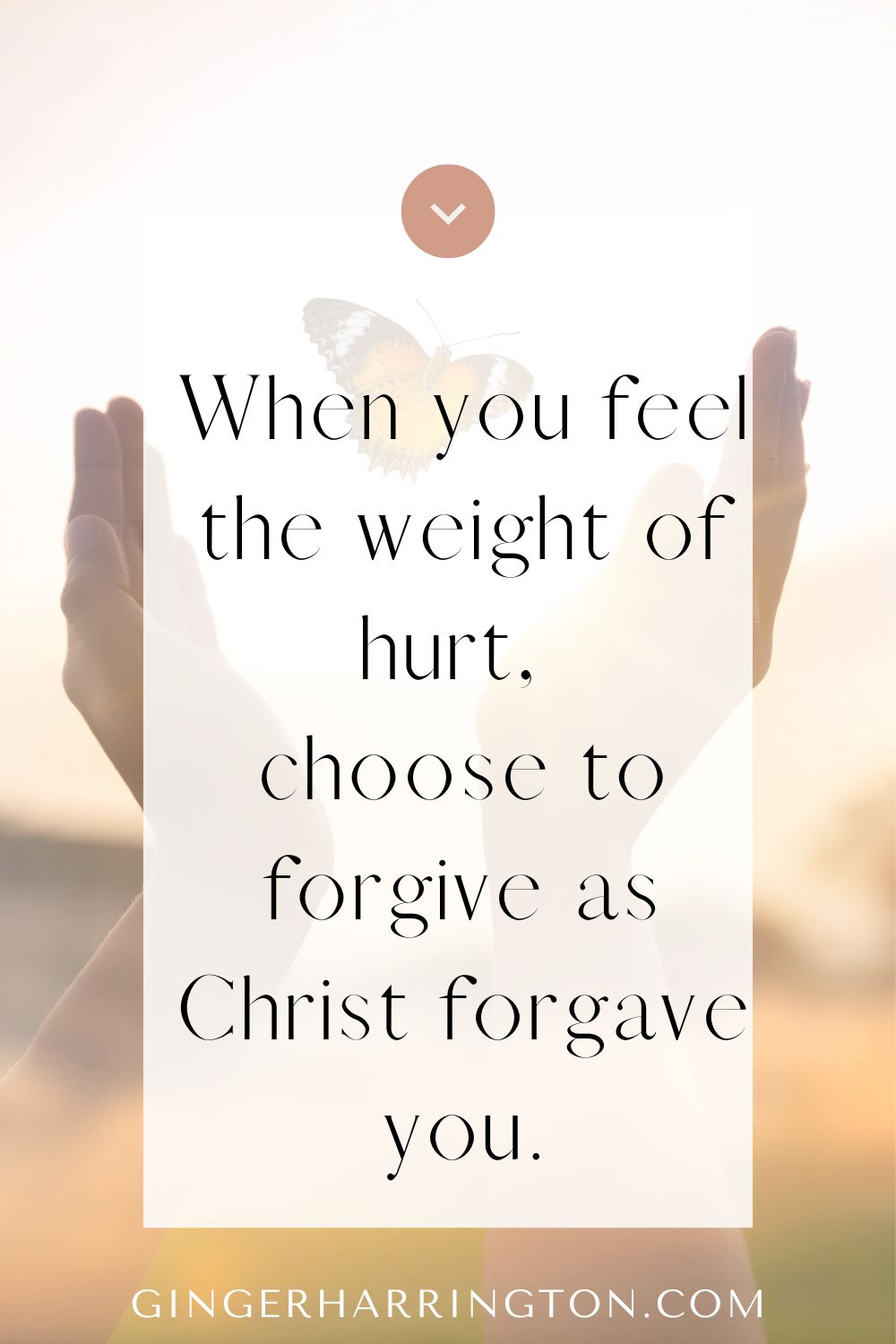
The Forgiveness Habit Prayer
Lord,
Thank you that you have forgiven me more than I deserve. You call me to forgive just as You forgave me through Christ. Right now, forgiveness feels hard. This hurt weighs heavy on my heart, but I know I don’t want to carry this bitterness any longer.
Today, I bring before You the person who hurt me and the pain it caused. I don’t want resentment to have power over me anymore. I name this wound and surrender it into Your hands. I choose to forgive _____ as You have forgiven me—not because the hurt was okay, but because I trust You with the healing and hope.
Help me to let go of anger and bitterness. Heal my heart, and teach me how to extend the same grace that You’ve shown me time and time again. Let Your love flow through me so that I may reflect Your grace to others.
Guide me to set healthy boundaries where needed, but keep my heart free from bitterness. I pray for peace in my soul and, if possible, for reconciliation. Thank You for the freedom that comes through forgiveness. By faith, I embrace Your grace that empowers me to love, even when it’s hard. When I struggle with my feelings, remind me that I have forgiven and released all of this into your hands.
Help me to practice forgiveness as a habit of hope in my life. Let it shape the way I respond to others, making forgiveness my first instinct instead of holding onto grievance. I trust You to lead me forward in the freedom of forgiveness.
In Jesus’ name, Amen.
Ready to Break Free from Bitterness and Walk in Forgiveness?
Want to go deeper? Listen to the full episode of the Habits of Hope Podcast where we unpack forgiveness in real-life struggles, share personal stories, and walk through practical steps.
Download “The Forgiveness Habit: A Practical Guid to Learning to Forgive“—a free resource based on this post that’s filled with biblical truths, practical steps, and reflection prompts to help you release resentment, set healthy boundaries, and experience the freedom God desires for you. Included the Forgiveness Habit Prayer.
📥 Get Your Free Guide Now! 👉 Click here or the image below.
Let’s choose forgiveness and walk in freedom together!
Recent Podcasts
21.Habit Stacking for Christians: Build Faith and Hope One Step at a Time What if even the smallest moments of your day could transform your faith and hope? In this insightful episode, Ginger and Larissa dive into the power of tiny, intentional habits to create spiritual growth and lasting hope.
22.How to Love Others Like Jesus: Actionable Steps for Everyday Life In this powerful episode, we explore what it truly means to love one another as Christ commanded in John 13:34-35. From practical steps like pausing to pray before reacting, to cultivating kindness and service, we uncover how to let Christ’s love flow through us in tangible ways.
23. Five Loving Ways to Strengthen Your Relationships with Grace Over Grievance Discover five biblical habits to strengthen relationships through humility, patience, and gentleness. Learn practical steps to build unity, extend grace, and reflect Christ’s love in your daily interactions. This episode is packed with relatable stories and actionable insights to cultivate thriving relationships.

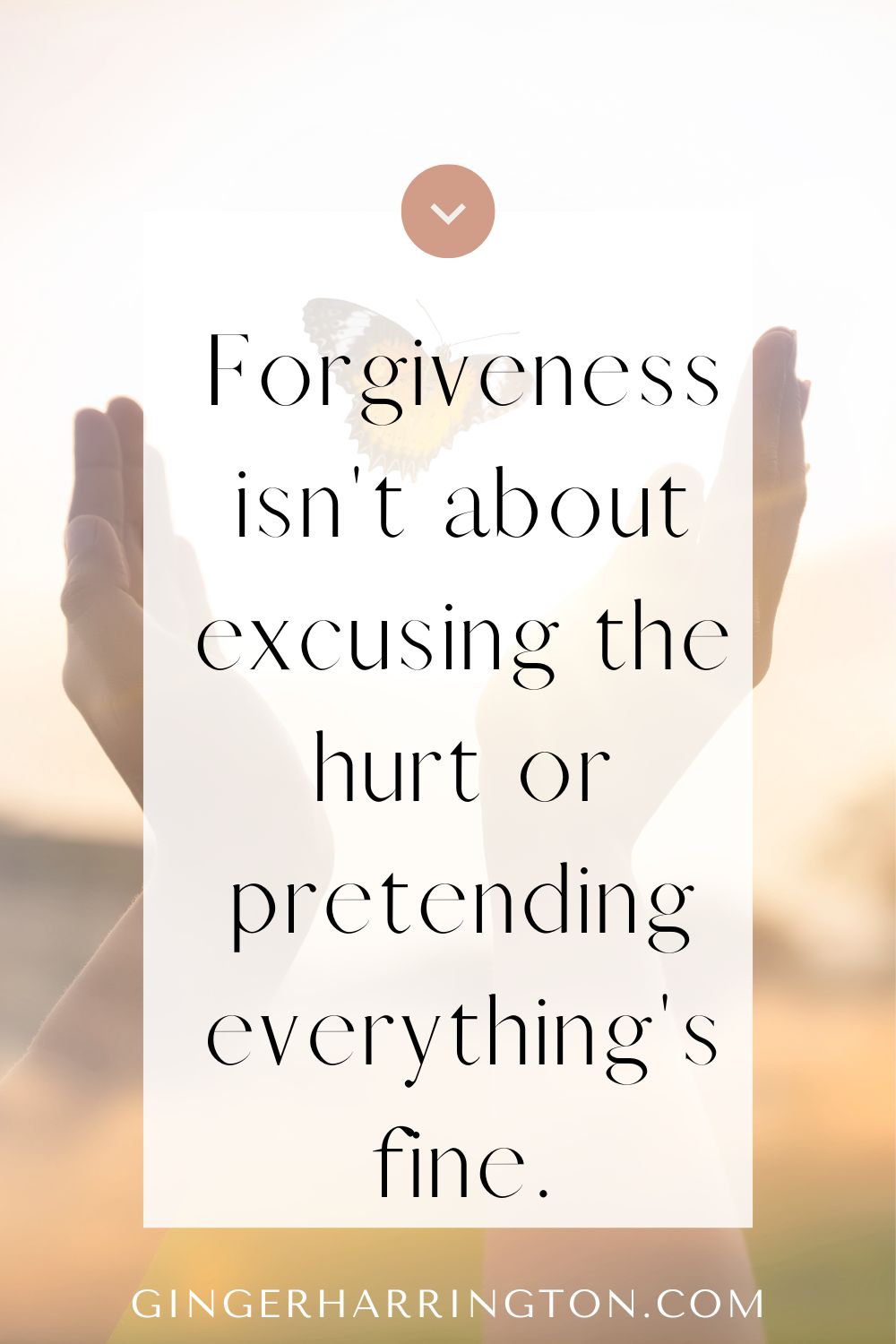
 So glad you're here. I help busy women—gals like you— build healthy habits for living well with biblical wisdom and practical steps to deepen your faith, increase your hope, and thrive in your purpose.
So glad you're here. I help busy women—gals like you— build healthy habits for living well with biblical wisdom and practical steps to deepen your faith, increase your hope, and thrive in your purpose.

